An account is required to join the Society, renew annual memberships online, register for the Annual Meeting, and access the journals Practicing Anthropology and Human Organization
- Hello Guest!|Log In | Register
Robert A. & Beverly H. Hackenberg Prize

The Robert A. and Beverly H. Hackenberg Prize recognizes SfAA members and their community partners whose work demonstrates sustained and meaningful collaboration to improve the communities where they live and work.
Each year, the Hackenberg Prize highlights the very best of what applied social scientists and their collaborators are doing in the community or region where the SfAA is meeting. The work of a SfAA member and collaborators is featured in a special session. The prize is commemorated with a plaque, and is accompanied by a cash award of $2,000 to be used to advance the collaborative effort.
This prize is named for Malinowski Award winners Robert and Beverly Hackenberg, whose distinguished applied research careers focused on health care and economic and community development in the United States and internationally. Wherever they worked, they emphasized the need for collaboration between social scientists and grassroots community organizations to identify local needs and develop culturally appropriate solutions.
Nominations (including self-nominations), suggestions, or inquiries should be addressed to Don Stull, Chair, Hackenberg Prize Committee (stull@ku.edu).
Previous Recipients
2021
Deal Island Peninsula Partnership (DIPP)
https://www.dealislandpeninsulapartners.org/
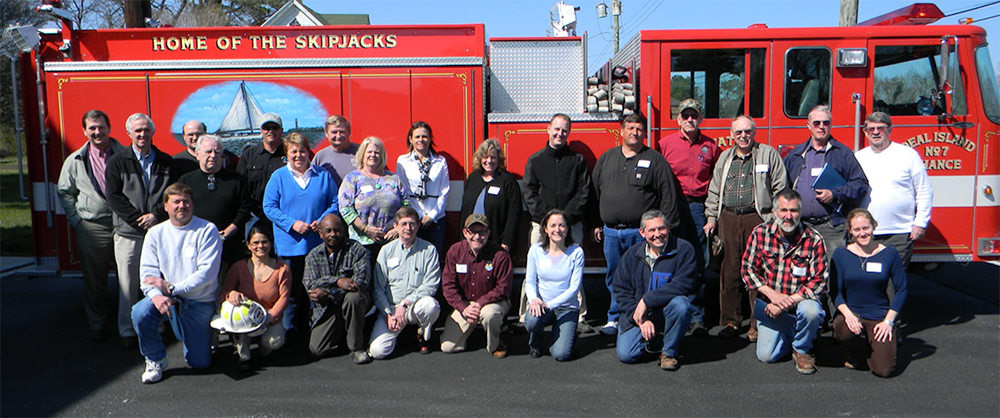
The Chesapeake Bay rests on the mid-Atlantic coast of the United States and is very vulnerable to sea-level rise. Located on the lower eastern shore of the Chesapeake Bay, Deal Island Peninsula is 26 square miles of low-lying coastline and home to approximately 1,000 people. In the 17th century, colonial farmers established communities on the peninsula that would later become commercial fishing centers. Today, peninsula residents include descendants of those early farmers and watermen as well as recent arrivals, including retirees and summer visitors. Much of the peninsula is prone to coastal storms, tidal inundation, roadway flooding, and shoreline erosion. These impacts are already affecting property values, access to homes and schools, and the health of local marshes, which buffer the communities from storms.
Begun in 2010, the Deal Island Peninsula Partnership (DIPP) seeks to increase the resilience of the peninsula’s communities and environment to cultural, socioeconomic, political, and ecological change. DIPP’s goal is to build a diverse network of stakeholders from the local communities, county and state governments, universities, and nongovernmental (NGO) civic and environmental organizations. DIPP relies heavily on collaborative learning as a conceptual framework to tackle potentially contentious social-ecological issues such as climate change. DIPP applied anthropologists integrate participant observation, interviewing, meeting facilitation, as well as qualitative and quantitative data collection to facilitate collaborative learning practices, create and sustain relationships among stakeholders who have little previous history of collaborating. DIPP’s network has expanded over the years to include over 150 members, including peninsula residents; natural, physical, and social scientists; resource managers and planners; and leaders of nongovernmental organizations. The network also includes 12 churches situated on the peninsula and in nearby rural coastal counties, five of which are African American.
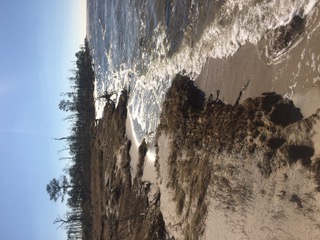
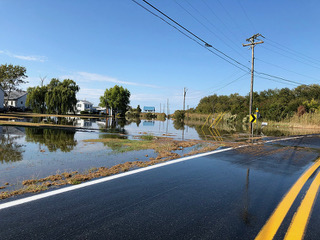 Among DIPP’s accomplishments are: restoration of an eroding shoreline that threatens an African American community and an adjoining salt marsh; identification and mapping of areas prone to tidal ditch flooding; and establishment of connections between rural churches, government agencies, and NGOs so church members can learn about different adaptation resources offered by government agencies. DIPP represents a network of diverse views, skills, experience, and access to resources that can be called upon to address social-ecological challenges. DIPP strives to employ this collaborative approach in larger environmental, climate change, and cultural heritage work in the Chesapeake Bay region.
Among DIPP’s accomplishments are: restoration of an eroding shoreline that threatens an African American community and an adjoining salt marsh; identification and mapping of areas prone to tidal ditch flooding; and establishment of connections between rural churches, government agencies, and NGOs so church members can learn about different adaptation resources offered by government agencies. DIPP represents a network of diverse views, skills, experience, and access to resources that can be called upon to address social-ecological challenges. DIPP strives to employ this collaborative approach in larger environmental, climate change, and cultural heritage work in the Chesapeake Bay region.
2020
Refugee and Immigrant Well-Being Project: A Community-University Partnership to Create Social Change
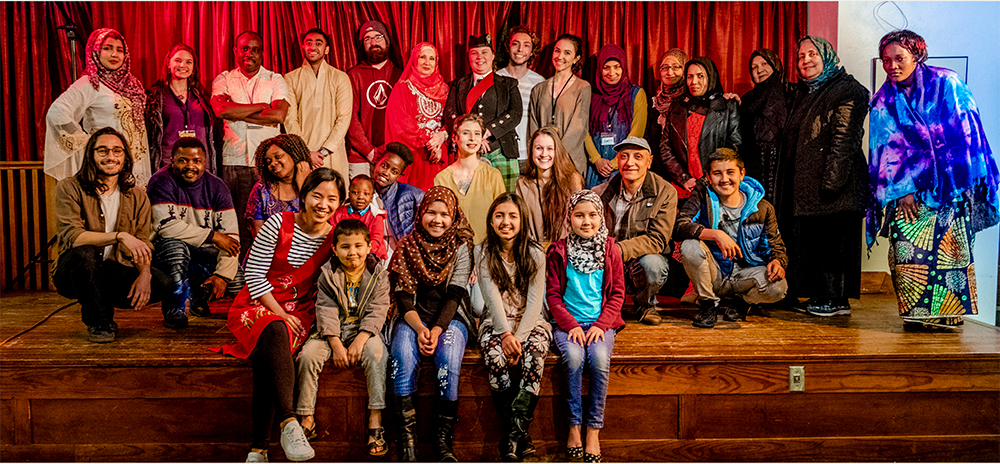
The Refugee Well-being Project (RWP) is a community-based participatory research project designed to better understand resettlement stressors, prevent psychological distress, and promote mental health, well-being, and integration of refugees and other newcomers in the United States. For more than 20 years, RWP has engaged undergraduate students and newcomers in mutual learning and mobilization of community resources. Through these processes, newcomers’ cultures, experiences, and knowledge are valued and utilized in the promotion of their well-being and communities’ responsiveness to newcomers is also improved. RWP employs an ecological perspective that takes into account the multiple systems and contexts that affect newcomer well-being. By design, the program has the potential to incorporate the strengths and needs of refugees while addressing multiple aspects of the empowerment process to work towards social change.
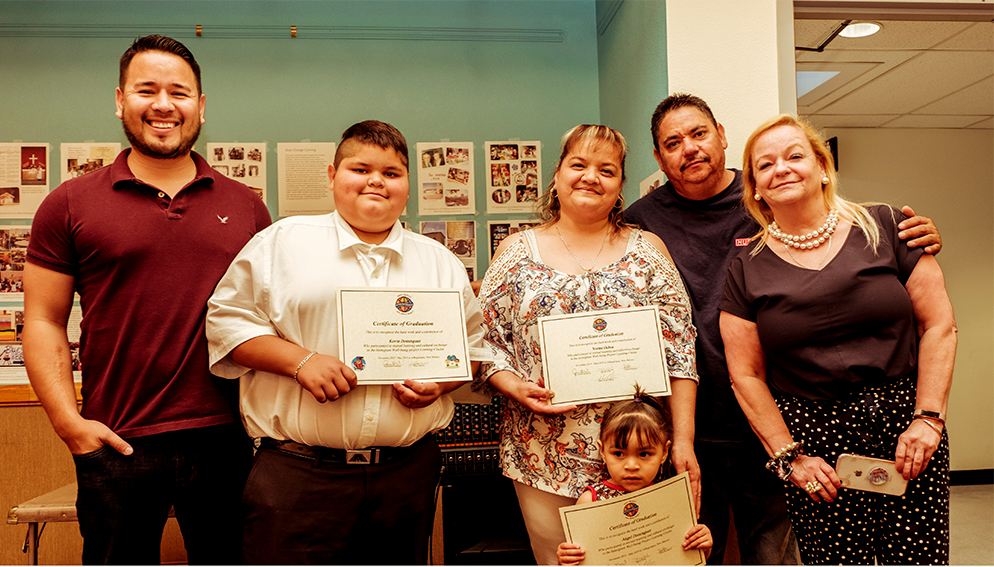 RWP was first developed and implemented in partnership with Hmong refugees at Michigan State University in 2000. In 2006, RWP began implementation at the University of New Mexico with refugees from Liberia and the Great Lakes region of Africa (Burundi, Democratic Republic of Congo, Republic of Congo and Rwanda). From 2009-2012, the RWP was adapted and implemented with refugees from Iraq. Following many years of longitudinal mixed method research, RWP received a grant from the National Institute on Minority Health and Health Disparities to conduct a randomized controlled trial with Afghan, Great Lakes African, Iraqi, and Syrian participants from 2013-2018. After generating conclusive quantitative and qualitative evidence of its effectiveness, the RWP is no longer a study and is now being led by refugee community leaders. However, we continue to work to advance the science of community-based social justice research through the Immigrant Well-being Project study to adapt the RWP model and implement it with Latinx immigrant families as a core research project of the Transdisciplinary Research Equity and Engagement (TREE) Center, which is funded by the National Institutes of Health at UNM from 2017-2022. Recently, the project has been renamed the Refugee and Immigrant Well-being Project . https://rwp.unm.edu/
RWP was first developed and implemented in partnership with Hmong refugees at Michigan State University in 2000. In 2006, RWP began implementation at the University of New Mexico with refugees from Liberia and the Great Lakes region of Africa (Burundi, Democratic Republic of Congo, Republic of Congo and Rwanda). From 2009-2012, the RWP was adapted and implemented with refugees from Iraq. Following many years of longitudinal mixed method research, RWP received a grant from the National Institute on Minority Health and Health Disparities to conduct a randomized controlled trial with Afghan, Great Lakes African, Iraqi, and Syrian participants from 2013-2018. After generating conclusive quantitative and qualitative evidence of its effectiveness, the RWP is no longer a study and is now being led by refugee community leaders. However, we continue to work to advance the science of community-based social justice research through the Immigrant Well-being Project study to adapt the RWP model and implement it with Latinx immigrant families as a core research project of the Transdisciplinary Research Equity and Engagement (TREE) Center, which is funded by the National Institutes of Health at UNM from 2017-2022. Recently, the project has been renamed the Refugee and Immigrant Well-being Project . https://rwp.unm.edu/
2019
2019 Winners are Jeremy Spoon (Portland State University & The Mountain Institute), Richard Arnold (Pahrump Paiute Tribe), and Collaborators
(Pahrump Paiute Tribe), and Collaborators
Revitalizing Numic Homelands: Blending Culture and Collaboration in the Great Basin and Upper Mojave Deserts
Since 2008, Jeremy Spoon, Richard Arnold, and other key collaborators have worked closely with 16 Nuwu (Southern Paiute), Newe (Western Shoshone), and Numu (Owens Valley Paiute and Shoshone), tribes and several federal agencies to understand, sustain, and revitalize cultural ties to their aboriginal lands. Numic homelands are considered alive and a personified relative. Indigenous collaborators share that the Creator placed humans on the land at the beginning of time when the world was new. We are charged with managing all elements within the landscape to keep it healthy and maintain a state of balance for future generations.
The collaboration shapes a unique understanding of the land using a progressive consultation framework that incorporates co-managing resources and developing co-created public education. These efforts evolved into a model that integrates tribal understanding through consensus and builds trust and multi-disciplinary capacity. The diverse panel shared perspectives reflecting on Indigenous, federal agency, public, and academic involvement.

2018
Alexandra Wolkoff, Puentes de Salud

2017

2016
Unexpected Consequences: How a Good Idea Changed Worlds
This session explores the impacts on individuals, Indigenous communities and the wider academy stemming from the Ethnohistory Field School with the Stó:lõ. This ongoing graduate course is a unique example of both community-engaged research and community-engaged learning that has transformed the worlds of students, faculty and Stó:lõ community members. Delicately merging social science methodologies with humanities approaches, the Field School started in 1998 and brings 10-12 students to spend a month living in Stó:lõ territory. While there, students live with Stó:lõ families, and work on research projects identified by the Stó:lõ elders and staff in partnership with faculty. In this panel, “teachers” in the broadest sense, and students (Stó:lõ and non-Stó:lõ) reflect on the unexpected consequences on careers, on research, and on the wider academy of the good idea that started this field school eighteen years ago.
 CHAIR: LUTZ, John (UVIC)
CHAIR: LUTZ, John (UVIC)
CARLSON, Keith Thor (U Sask) Stó:lõ Ethnohistory Field School: A Humanities Makeover for a Social Science Methodology
PENNIER, Grand Chief Clarence (Stó:lõ Tribal Council) Sto:lo Leadership Expectations for the Ethnohistory Field School
Naxaxahts’i (MCHALSIE, Sonny) (Sto:lo Rsch & Resource Mgmt Ctr) Collaboration and Partnership between Community, Faculty, and Students in the Ethnohistory Field School
ENNS, Shannon (Terra Archaeology Ltd) Ethnohistory Field School ‘Homestay’ Relations: Building Friendships and Inspiring Youth
OSMOND, Colin (U Sask) From the Archives to the Field: A Student Experiences in Ethnohistory
SCHAEPE, David M. (Stó:lõ Rsch & Resource Mgmt Ctr) Knowledge Creation: A Fabric of Relations
HAGGARTY, Liam (Mt Royal U) Xexá:ls Comes to Calgary: Legacies of the Ethnohistory Field School
LUTZ, John (UVIC) Trying to Gather a Little Knowledge: The Long Term Implications of Community-University Collaboration
Unexpected Consequences: The Ethnohistory Field School with the Stó:lõ
When, in 1997, a young historian employed by the Stó:lõ Nation, proposed something unheard of to the staid historians at the University of Victoria – an “Ethnohistory Field School” -- it seemed unlikely that such an enterprise would ever get off the ground. Almost twenty years later it’s still thriving.
At that time, Keith Carlson had a recently minted History MA from the University of Victoria (on American decolonization in the Philippines), and the Stó:lō Nation was a consortium of 19 Indigenous Communities in the Fraser Valley west of Vancouver. The proposal piqued the interest of John Lutz, who had only just been hired at UVic a few months prior. It was a simpler time, university bureaucracies were small, so Lutz and Carlson only needed to persuade the Department Chair -- which they did -- with difficulty. The two co-taught the course with the help of Stó:lõ Cultural advisor Naxaxahts’i (Sonny McHalsie), Stó:lõ archivists (first David Smith and then Tia Halstead) and other Stó:lõ Nation staff, such as archaeologist Dave Schaepe and cultural advisor Herb Joe.
 The principle was simple. Students and faculty would assist Stó:lō communities and conduct ethnohistorical research and analysis on community-identified projects. Archaeology and anthropology field schools had been operating in their territory but the Stó:lõ also had historical questions they wanted answered. The different Stó:lõ communities were asked to come up with research questions, and the students would chose topics from that list. Students would be trained by the faculty and mentored by Stó:lō staff as they conducted interviews and scoured archival records. Grand Chief Lester Ned of Sumas told us, “Don’t tell us what we want to know. Tell us what we need to know.”
The principle was simple. Students and faculty would assist Stó:lō communities and conduct ethnohistorical research and analysis on community-identified projects. Archaeology and anthropology field schools had been operating in their territory but the Stó:lõ also had historical questions they wanted answered. The different Stó:lõ communities were asked to come up with research questions, and the students would chose topics from that list. Students would be trained by the faculty and mentored by Stó:lō staff as they conducted interviews and scoured archival records. Grand Chief Lester Ned of Sumas told us, “Don’t tell us what we want to know. Tell us what we need to know.”
The first Ethnohistory Field Schools got off to a rocky start in the springs of 1998 and 2000. Graduate students spent the damp month of May living in a smoky, leaky, long-house working on their projects. The Stó:lõ did not quite know what to do with them; Lutz was new to the Stó:lõ and not able to be present 100% of the time. We learned a lot of lessons.
 By 2003 Carlson had his PhD from UBC and a tenure-track job at the University of Saskatchewan and he and Lutz returned to the Field School with 10 students (5 from each of the two universities) and an idea that revolutionized the course: for the first week, students would board with Stó:lõ families.
By 2003 Carlson had his PhD from UBC and a tenure-track job at the University of Saskatchewan and he and Lutz returned to the Field School with 10 students (5 from each of the two universities) and an idea that revolutionized the course: for the first week, students would board with Stó:lõ families.
The home-stay component transformed the field school. The intimacy of the experience acquainted students with the lives of contemporary Stó:lõ while it introduced Stó:lõ families to bright, young university students eager to learn about their history and culture. In so many instances, friendships were made in that week, which grew over the following month, and many persist to this day. As more families got involved, the field school started to become an institution that was widely known, and even eagerly anticipated in many Stó:lõ communities.
The successful pattern involved starting the field school on a Friday afternoon with a brief introduction to the faculty and staff and then sending them in pairs to spend the weekend with their homestay families. The next week they meet every morning for a three-hour seminar and spend the afternoons reading, planning their projects. Evenings they are back with their home stay hosts. By the end of the second week, students have had a rigorous training in research methodologies and participated in intensive cultural orientation sessions on foot, by car, and on boats on the Fraser River with Naxaxahts’i.
Naxaxahts’i still leads these cultural orientations, bringing faculty and students to sites to learn the Stó:lõ place names and legendary stories that are tied to them. He shows us the hunting, berrying and fishing grounds, and takes us to ancient village sites. Senior Archeologist, and now director of the Stó:lõ Research and Resource Management Center, Dave Schaepe, similarly brings us to visit burial mounds, pit houses, and ancient settlements.
 By the fourth iteration in 2005, communities were regularly inviting students to their cultural events including First Salmon Ceremonies, canoe races, weddings, powwows, funerals, burnings, and spiritual healings, and offering students’ workshops in the Halkomelum Language, drum making, native food plants and working with cedar. The Field School is timed to co-ordinate with the Stó:lõ’s own bi-annual “People of the River” conference where they invite researchers working in their territory to present back to the community, so many alumni from previous field schools present their work, which is also placed in the Stó:lõ Archives and, since 2005, put on-line.
By the fourth iteration in 2005, communities were regularly inviting students to their cultural events including First Salmon Ceremonies, canoe races, weddings, powwows, funerals, burnings, and spiritual healings, and offering students’ workshops in the Halkomelum Language, drum making, native food plants and working with cedar. The Field School is timed to co-ordinate with the Stó:lõ’s own bi-annual “People of the River” conference where they invite researchers working in their territory to present back to the community, so many alumni from previous field schools present their work, which is also placed in the Stó:lõ Archives and, since 2005, put on-line.
As we plan the 2017 Field School we can look back with satisfaction at the seventy-five research papers that students have produced in partnership with the Stó:lō. Thirteen graduate theses or papers have additionally been produced, along with atlas plates, a special issue of a journal, and a selection of scholarly articles. A special collection of essays highlighting the best of the field school research papers is now working its way towards publication with a scholarly press. The seventy-five Field School alumni are scatted around the globe working in many fields for Indigenous People and governments, including as lawyers, researchers, and at least six as university professors, two of which have started their own field schools. Now that was unexpected!
2014
JoAllyn Archambault
 The Robert Hackenberg Lecture 2014 guest speaker will be Prof. JoAllyn Archambault, Program Director of the American Indian Program at the National Museum of Natural History, Smithsonian Institute, Washington, DC.
The Robert Hackenberg Lecture 2014 guest speaker will be Prof. JoAllyn Archambault, Program Director of the American Indian Program at the National Museum of Natural History, Smithsonian Institute, Washington, DC.
The presentation is titled An Indian Anthropologist or an Indian who happens to be an anthropologist: American Indian people have a convoluted relationship with anthropology, applied or otherwise, while anthropologists of all sorts have an even more complicated connection with the subjects of their research. This history is of long making and has changed its complexion several times, especially as more Native students began entering the field in the late 1960’s and 70’s. Younger people have demanded new arrangements between tribes, native individuals, urban and rural communities, and national Indian organizations. National cultural developments such as the rise of ethnic nationalism have also played a role. This and other topics will be discussed in the lecture.
This topic and frame of analysis reflects precisely the life work of Robert Hackenberg, for whom the Lecture is named.
Archambault earned her doctorate at the University of California in Berkeley in 1984, where she later taught Native American Studies. As Program Director at the National Museum of Natural History she has organized various exhibitions, including Plains Indian Arts: Change and Continuity, 100 Years of Plains Indian Painting, Indian Baskets and Their Makers, and Seminole Interpretations.
2012
 James A. Trostle
James A. Trostle
The 2012 Hackenberg Lecture will be given by Prof. James Trostle, Dana Research Professor at Trinity University (Conn.) The title of his presentation is “A Road to Illness: Crossing Political, Scalar, and Disciplinary Boundaries.” Prof. Trostle’s presentation will use the example of regional disease transmission to identify the variables which impact that process. In turn, this analysis will provide a platform from which he will stress the importance (and pitfalls) of interdisciplinary exchange and cooperation.
This topic and frame of analysis reflects precisely the life work of Robert Hackenberg, for whom the Lecture is named. At the time of his death in 2007, Prof. Hackenberg was Professor Emeritus at the University of Colorado and Adjunct Research Scientist at the University of Arizona. He earned the Ph.D. degree from Cornell University.
Much like the Lecture namesake, Prof. Trostle has a lengthy record of applied social science research on health-related topics. Moreover, he has held several international assignments, including a position at the National Institute of Pubic Health in Mexico. He earned the Ph.D. and the M.P.H. degrees from the University of California (San Francisco/Berkeley), and held post-doctoral positions at Columbia University and the Mayo Clinic.
Jim Trostle is the Dana Research Professor of Anthropology and department chair at Trinity College (Hartford, CT). He held prior positions as Professor of Public Health at the National Institute of Public Health in Mexico (2001-03); founding director of the Five College Program in Culture, Health, and Science (1995-98); and Senior Social Scientist at the Harvard Institute for International Development (1988-95). He served from 2000-09 as a representative to WHO’s Americas Regional Advisory Panel in the Human Reproduction Programme, and from 2008-11 served as a member of WHO’s Expert Panel, Thematic Reference Group on Environment, Agriculture, and Infectious Diseases; Special Programme for Research and Training in Tropical Diseases. Following his receipt of a Weatherhead Resident fellowship at the School for Advanced Research in Santa Fe (2009-10), he was elected to the SAR Board of Managers. He has taught or consulted in more than 25 countries, primarily in Latin America.
Trostle holds a PhD from the joint medical anthropology program at UC San Francisco and Berkeley and an MPH from the School of Public Health at Berkeley. He did postdoctoral research at Columbia University and the Mayo Clinic. Trostle’s scholarship combines medical anthropology and epidemiology. Since 2000 he has been co-principal investigator on a longitudinal study of disease transmission funded by NIH and NSF, which is documenting changes in social life and health that follow the construction of a paved road in a previously road- less region of coastal Ecuador. He is author of Epidemiology and Culture (Cambridge 2005) and co-author of De la Investigación en Salud a las Políticas: la Difícil Traducción (From Health Research to Policy: The Difficult Translation (Manual Moderno and the Instituto Nacional de Salud Pública, Mexico, 2000) as well as more than 40 journal articles and book chapters. Trostle has also written on research capacity-building and medication use for both infectious and chronic non-infectious diseases. He teaches courses on medical anthropology, global health, research methods, community-campus partnerships, the anthropology of science, and international development.
2009
 Gabriel Garcia
Gabriel Garcia
Dr. Gabriel Garcia is a Professor of Medicine and Associate Dean for Medical School Admissions at Stanford University School of Medicine, as well as the Peter E. Haas Faculty Director of the Haas Center for Public Service at Stanford University. He was born in Cuba and grew up in Guaynabo, Puerto Rico. Dr. Garcia completed his medical training at New York University. He did post graduate training at Stanford, where he developed an interest in liver disease. He completed his residency in Internal Medicine, and fellowships in Gastroenterology, Substance Abuse and Alcoholism, and Infectious Diseases (Research) at Stanford University School of Medicine. Subsequently, he joined the faculty at Baylor University in Houston, where he practiced and taught before returning to Stanford in 1991.
He specializes in the care of patients with viral hepatitis and other liver diseases, and has research interests in the natural history and management of patients with liver diseases. He was the transplant hepatologist in the original transplant program at Stanford. Dr. Garcia has clinical research interests in the natural history of chronic viral hepatitis. He has testified to the Institute of Medicine on the role of the committee on admissions in promoting diversity in medical schools and the medical workforce. He also teaches an undergraduate patient advocacy course at Stanford University and supervises an alternative spring break that studies how we deliver health care to our most needy communities.

Cart
Search